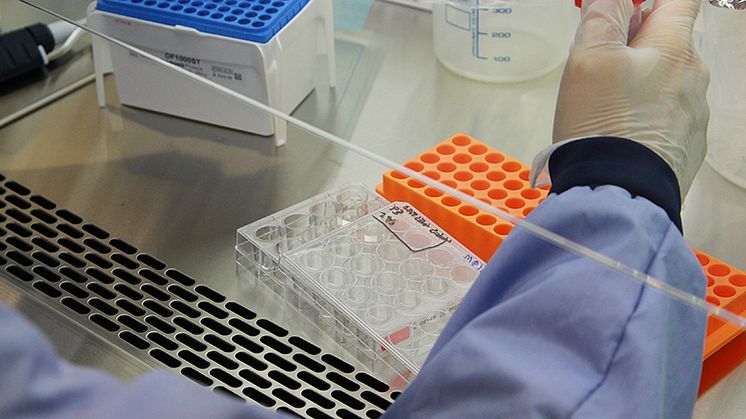
Press release -
Gut epithelium muscles up against infection
To maximise absorption of nutrients from the diet, the intestinal mucous membrane has a large surface area. However, this also makes it vulnerable to attack from aggressive gut microbes. A new study by Uppsala University researchers now shows that the surface layer of the mucosa, known as the epithelium, can rapidly contract when it recognises a bacterial attack. The results are published in the journal PNAS.
peer review/observational study/cells
Every year, hundreds of millions of people worldwide suffer from bacterial gut infections of one kind or another, which are often hard to treat. Antibiotics can kill the normal flora of the intestine, and this environment offers many recesses where bacteria can lurk. The growing emergence of resistance, moreover, means that many types of antibiotic no longer have any effect on the bacteria.
Mikael Sellin and his research group at the Science for Life Laboratory (SciLifeLab) and the Department of Medical Biochemistry and Microbiology, Uppsala University, have been studying the interplay between the intestinal mucosa and microorganisms. Their hope is that, by understanding how the mucosa distinguishes between friend and foe and modifies its behaviour accordingly, they can pave the way for better ways of treating aggressive bacterial disease in the future.
Aggressive intestinal bacteria, such as Salmonella, have the ability to invade the mucosal epithelial cells and then spread further in the body. In the new study, the researchers found that a protein complex (“the inflammasome”) located inside the epithelial cells recognises the invasion at once. The inflammasome sends alarm signals to other, surrounding epithelial cells, causing them to contract. This increases the packing of the epithelial cells locally in infected areas, which proved necessary to prevent the epithelium from tearing because of the damage later caused by the infection.
The study was made feasible by new technology for growing intestinal tissue from both mice and humans, outside of the body. With advanced microscopy, the scientists could follow in real time how aggressive bacteria invade the intestinal mucosa, and how the mucosa responds to the attack.
Besides the research group led by Mikael Sellin, several other researchers at Uppsala University, the University Hospital and international institutions contributed to the study.
For more information, contact Mikael Sellin, Associate Senior Lecturer in Infection Biology, Science for Life Laboratory and Department of Medical Biochemistry and Microbiology, Uppsala University. Telephone: 46 73 913 52 53, Email: mikael.sellin@imbim.uu.se
Reference: Pilar Samperio Ventayol et al., (2021) Bacterial detection by NAIP/NLRC4 elicits prompt contractions of intestinal epithelial cell layers, PNAS, Vol. 118 No. xx e2013963118, doi: 10.1073/pnas.2013963118
Topics
Uppsala University
The first University in Sweden. Quality, knowledge, and creativity since 1477. Education and research of the highest quality and relevance to society, business, and culture. Uppsala University is ranked among the world’s top higher education institutions. www.uu.se
